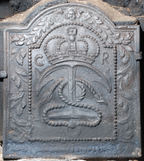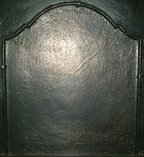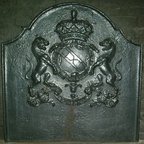-
930
Description: Carved wooden fireback pattern. Arched rectangular central panel with cavetto-canted shoulders and bead edging on a broad fillet; seated female figure in a chariot drawn by armadillos, symmetrical hanging drapery above right; same-shaped border with fillet edging at top, and suspended ribbons with floral bunches; at base, symmetrical palm leaves tied with ribbon; symmetrical serpents on top their tails intertwined.
Notes: The design is derived from a personification of America, on one of a set of playing cards entitled Jeu de la Géographie, designed by Stefano della Bella (1677); reputedly from Mayfield; presented to Brighton Museum by Henry Willetts. A casting from this pattern is no. 215.
- Decoration tags:
- 'Dutch' (shape)
- whole carved pattern
- planklines
- pictorial
- allegorical
- animals
- humans
- objects
Manufactured: in the late-17th to early-18th century in England.
Current location: Rottingdean Grange, Rottingdean, East Sussex, England.
Museum number: R3341/7 (part of the Brighton Museum museum group)
Citation: Dawson, C., 1903, 'Sussex Iron Work and Pottery', Sussex Archaeological Collections, 46, pp. 1-54.
Citation: Hughes, G. B., 1960, Collecting Antiques (London, Country Life), pp. 85-93.
Citation: Hughes, G. B., 21 Apr 1955, 'Old English Firebacks', Country Life, 117, pp. 1056-60.
- Attached to series:
- Patterns
- Mayfield 'Dutch' series
-
668
Description: Arched rectangular shape with symmetrical floral scrolls on top; three horizontal plank lines; ovolo moulding all round edge of main panel; central figure of a bearded man wearing knee-length coat, belted at waist, and holding a sledge hammer in his right hand, his left arm akimbo; various ‘tools’ of his trade arranged about him; (clockwise from top left) a circular cartouche with a central bead; the date split on either side of his head; a floral console supporting a shelf bearing a flagon, a tankard and a goblet; a circular cartouche with a central bead, a mirrored image of the one in the top left corner; from the top of the cartouche a dog leaping up at its master; between the man’s legs a long-handled ladle, a weight and a cooking pot; a ringer, used to pull slag off molten iron; part of the elevation of a blast furnace, with wooden framework, casting house, and flames issuing from the top; an ore basket, wheelbarrow and a charcoal clamp.
Notes: A pastiche of the 1636 original Lenard fireback (no. 429), now often mistaken for it; the inscription is missing, as are the fireback and the shield each being replaced by a form of cartouche; the figure of the man is more naturalistically modelled, yet wearing similar clothes; his feet face outwards.
Copies of this fireback are known.
Inscription: 1639
- Decoration tags:
- rectangular with round arch (shape)
- ovolo (edging)
- whole carved pattern
- pictorial
- text
- humans
- objects
Manufactured: in the 18th century possibly in the Weald area of England.
Current location: Rottingdean Grange, The Green, Rottingdean, East Sussex, England.
(part of the Brighton Museum museum group)
- Attached to series:
- Miscellaneous pattern firebacks
-
669
Description: Rectangular; reversed cavetto-moulded edge on top and sides; pictorial scene depicting Abraham about to sacrifice Isaac; Abraham is on the left, holding the top of Isaac’s head with his left hand, his right hand holding a sword; in the middle stands a pyre; above and to the right an angel emerges from the clouds, while below a ram stands beside a bush; the inscription is above and to the left.
Notes: The scene is drawn from Genesis 22: 11; And the angel of the Lord called unto him out of heaven, and said, “Abraham, Abraham”: and he said, “Here am I”. The subject and the naïve figuration is similar to a fireback incorporating two other Old Testament scenes (no. 94), and may be the work of the same pattern maker.
Inscription: ABRAHAM ABRAHAM [Genesis 22: 11]
- Decoration tags:
- rectangular (shape)
- reversed cavetto (edging)
- whole carved pattern
- pictorial
- biblical
- architectural
- text
- humans
- plants
Manufactured: in the early- to mid-17th century possibly at Brede Furnace in the Weald area of England.
Current location: Rottingdean Grange, The Green, Rottingdean, East Sussex, England.
(part of the Brighton Museum museum group)
- Attached to series:
- Brede group
- Old Testament & Apocrypha firebacks
- Abraham & Isaac firebacks
-
670
Description: Arched rectangular shape; cavetto edging; three ostrich feathers issuing from a royal coronet; a blank motto banner below; the initials bottom left, above banner.
Notes: The badge of the Prince of Wales; perhaps cast during the Commonwealth period. A copy personalised with added initials.
Copies of this fireback are known.
Inscription: IL
- Decoration tags:
- rectangular with round arch (shape)
- cavetto (edging)
- whole carved pattern
- individual letters
- heraldic
- text
Manufactured: in the mid-17th century in the Weald area of England.
Current location: Rottingdean Grange, The Green, Rottingdean, East Sussex, England.
(part of the Brighton Museum museum group)
- Attached to series:
- Prince of Wales firebacks
- Small cavetto series
-
671
Description: Arched rectangular central panel with hollow bead edging on a broad fillet; figure of a woman standing on a mound, holding a bow in her right hand and an arrow in her left, a plant to her right, and drapery swags above; arched rectangular border with symmetrical swirls of foliage and diagonal leaves at corners; monogram centre bottom between swirled tendrils; on top, symmetrical, swirled foliage.
Notes: The figure is of Diana, goddess of the Moon and of hunting; she carries a bow and arrow, and has a hound at her feet. The depiction is derived from 'Statues of Roman Gods', a set of engravings dated 1585, by Philips Galle after Jacques Jonghelinck. Copies of this fireback were advertised in Burton Weir's (Rotherham) catalogue in the early-20th century.
Copies of this fireback are known.
Inscription: SHR
- Decoration tags:
- 'Dutch' (shape)
- fillet (edging)
- whole carved pattern
- pictorial
- mythological
- monogram
- text
Manufactured: in the late-17th to early-18th century in England.
Current location: Rottingdean Grange, The Green, Rottingdean, East Sussex, England.
Museum number: RGTMP000082 (part of the Brighton Museum museum group)
Citation: Elling, W. & Winkler-Borck, S., 1992, Ofen- und Kaminplatten (Vreden, Hamaland-Museum).
- Attached to series:
- SHR series
- British 'Dutch' style firebacks
-
368
Description: Canted rectangle; twisted rope edging (top and sides); Tudor royal shield within a Garter, supported by lion and dragon stamps, a crown above, between separate ‘E’ and ‘R’ stamps; fleur de lys stamp irregularly repeated four times below right and to left of lion.
Notes: The shield, garter and crown stamps appear on many firebacks, usually with left-facing lion and greyhound supporters; the presence of the shield and crown indicate the fireback is derived from the same source; the supporter stamps, which are over-pressed, are clearly derived from blocks intended to represent standing models. Formerly at Kirby Frith Hall, Leicestershire. Illustration from Schubert, 1957, pl. 7.
Inscription: HONE SOYT qVEY MAL Y PENSE
Arms: Tudor royal - Edward VI or Elizabeth I
- Decoration tags:
- rectangular with canted top corners (shape)
- rope (edging)
- carved stamps
- individual letters
- heraldic
- armorial
- royal
- text
Manufactured: in the mid- to late-16th century possibly at Pounsley Furnace, Framfield in the Weald area of England.
Current location: Newarke Houses, Leicester, Leicestershire, England.
Museum number: H.101.1930.0 (part of the Leicester City Museums museum group)
-
683
Description: Rectangular; twisted rope edging (top and sides); top left and right, Tudor rose surmounted by a crown (separate stamps); right of centre, irregular pentagram formed of a repeated length of twisted rope enclosing a Tudor rose; on either side of top point of pentagram, a triple-loop stamp irregularly spaced.
Notes: The pentagram has both Christian and occult symbolism. The fleur and the rose and crown have been seen on another fireback.
Copies of this fireback are known.
- Decoration tags:
- rectangular (shape)
- rope (edging)
- simple stamps
- carved stamps
- heraldic
- apotropaic
- objects
Manufactured: in the late-16th century possibly in the Weald area of England.
Current location: in private hands, Sevenoaks, Kent, England.
- Attached to series:
- Rope design firebacks
- Looped fleur series
- Fleur-de-lys firebacks
-
684
Description: Arched rectangular central panel with bead edging; an inverted, cabled anchor surmounted by a crown, flanked by one initial each side; arched rectangular border with cavetto-moulded edging; top centre, face of a putto with flowing leaf arrangement descending each side.
Notes: An English pastiche of the ‘Dutch’ style of fireback, which became popular in the second half of the seventeenth century. One of a small series of firebacks with similar proportions and detail. Copies of this fireback were advertised in the Wayte & Cheverton (Edenbridge) catalogue in the early-20th century.
Copies of this fireback are known.
Inscription: C R
- Decoration tags:
- rectangular with round arch (shape)
- cavetto (edging)
- whole carved pattern
- planklines
- heraldic
- text
- objects
Manufactured: in the mid- to late-17th century in England.
Current location: in private hands, Sevenoaks, Kent, England.
- Attached to series:
- Carolean 'Dutch' series
- Miscellaneous royal firebacks
-
685
Description: Rectangular with arched rectangular shaped top joined by cavetto curves; astragal edging; plain surface for the addition of other stamps or panels.
Notes: Used for armorials by the Dukes of Dorset.
- Decoration tags:
- rectangular with canted top corners and round arch (shape)
- astragal (edging)
- whole carved pattern
Manufactured: in the early-18th century in the Weald area of England.
Current location: Knole, Sevenoaks, Kent, England.
Museum number: 129673 (part of the National Trust museum group)
- Attached to series:
- Dorset arms series
- Base boards
-
687
Description: Rectangular with arched rectangular shaped top joined by cavetto curves; astragal edging; shield, supporters, ducal coronet, motto and garter of the Duke of Dorset: Quarterly, Or and gules, a bend vair.
Notes: Almost certainly the arms of Lionel Sackville KG (1688-1765), created first duke of Dorset in 1720.
Copies of this fireback are known.
Inscription: [around shield] HONY SOIT QUI MAL Y PENSE / [on motto scroll] AUT NUNQUAM TENTES, AUT PERFICE
Arms: Lionel Sackville, 1st Duke of Dorset
- Decoration tags:
- rectangular with canted top corners and round arch (shape)
- astragal (edging)
- carved pattern panels
- armorial
- text
Manufactured: in the early-18th century in the Weald area of England.
Current location: Knole, Sevenoaks, Kent, England.
Museum number: NT/KNO/M/41 (part of the National Trust museum group)
- Attached to series:
- Dorset arms series
- Sackville firebacks
- Personal armorial firebacks
.jpg)
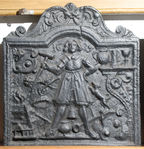
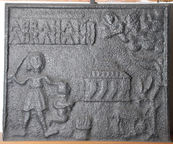
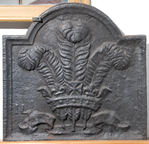
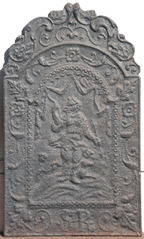
 01.jpg)

